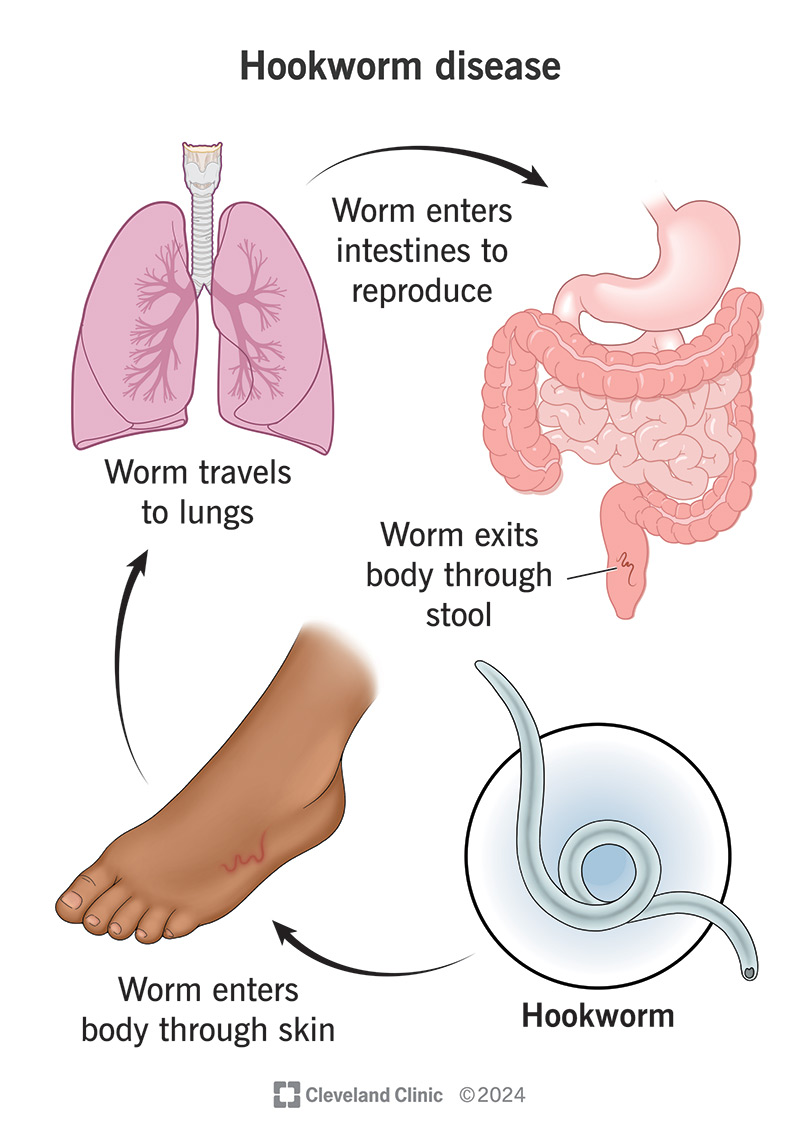Hookworms are parasites that live in the intestines of people who are infected. Hookworm eggs (larvae) spread in poop of people with hookworm disease. Many people have no symptoms, but signs of a hookworm infection include skin rash, fever, stomach pain and diarrhea. Medication can treat the infection.
Advertisement
Cleveland Clinic is a non-profit academic medical center. Advertising on our site helps support our mission. We do not endorse non-Cleveland Clinic products or services. Policy

Image content: This image is available to view online.
View image online (https://my.clevelandclinic.org/-/scassets/Images/org/health/articles/14072-hookworm-disease.jpg)
Hookworm is a parasite that infects your intestines. There are two main types of hookworm that infect humans: Ancylostoma duodenale and Necator americanus.
Advertisement
Cleveland Clinic is a non-profit academic medical center. Advertising on our site helps support our mission. We do not endorse non-Cleveland Clinic products or services. Policy
Hookworm larvae (eggs) break through your skin. They travel through your body and hatch once they reach your intestines. As the name implies, hookworms have a hook-like head that attaches to your intestinal walls. These tiny worms can cause a number of health problems, including iron-deficiency anemia, diarrhea and abdominal pain.
Hookworm infection is most common in tropical and subtropical areas, especially if sanitation isn’t as good and people walk barefoot on contaminated soil. In the past, hookworm was a serious problem in the southern United States, but improved sanitation has made it much less common.
A parasite is an organism that needs to live on or inside another organism (animal or human). The parasite relies on its host (the creature it lives in or on) to survive.
Hookworms are parasites that live inside your intestines. There, they feed on blood from your intestinal wall, mature and lay eggs.
Hookworm disease is widespread in many parts of the world. As many as 740 million people worldwide have hookworm disease.
Many people with a hookworm infection have no symptoms. Those who do have symptoms may experience mild ones at first. Symptoms progress as the infection gets more severe.
Advertisement
Possible hookworm symptoms include:
Hookworm larvae pass in the feces (poop) of someone already infected with hookworm disease. If a person with hookworm disease poops outdoors, the larvae enter the soil. Using human feces as fertilizer can also contaminate the soil.
If you walk barefoot on infected soil, the larvae can enter your body by breaking through the skin on your feet. After infected larvae enter through your skin, they travel through your body:
Yes. You can get hookworm by coming in contact with poop from an infected person. Hookworm infections also spread through contact with infected soil.
Hookworm infections in dogs, cats and other animals typically come from a different species than the ones that infect humans. Animal hookworms can sometimes penetrate a person’s skin, but they don’t mature or lay eggs inside a human host.
Animal hookworms can cause a rash as they move under your skin. This itchy rash, called cutaneous larva migrans, shows up as a thin, raised red line that spreads across your skin.
Hookworm disease is most common in warm, humid and tropical locations. It’s especially common in places lacking indoor sanitation.
Hookworms feed on blood in your intestines. An untreated, severe infection results in blood loss. Blood loss can lead to anemia and protein deficiency. Severe anemia can cause:
Children infected with hookworms over long periods of time can develop severe effects from lack of iron and protein. This can slow both their physical and mental development.
If you have symptoms of hookworm disease, your healthcare provider will test a sample of your poop (stool). They’ll analyze the stool sample under a microscope to look for hookworm eggs.
If you’ve recently traveled to an area where hookworm is common, your provider may recommend blood tests. A complete blood count (CBC) can show eosinophilia (higher than normal white blood cell count). This sign of hookworm disease can show up weeks before eggs are present in your poop.
Advertisement
If tests show that you have hookworm disease, your provider will prescribe medications that treat the infection. In most cases, hookworm treatment includes an anthelmintic medication (medication used to destroy parasitic worms) orally (by mouth) for one to seven days.
Your provider may prescribe these medicines to get rid of parasitic worms:
Your provider may also prescribe iron supplements if you have anemia from hookworm disease.
Hookworms may go away on their own, but it can take many years. During that time, they can cause serious health complications, like malnutrition and anemia. With treatment, you can get rid of hookworms and avoid any possible complications.
Hookworm disease is easily curable with appropriate medication. Most symptoms — including anemia — will go away once the infection clears.
You can prevent hookworm disease by:
You should call your healthcare provider if you have:
Advertisement
You may want to ask your healthcare provider:
Hookworm disease is a common parasitic infection in many parts of the world. Most people get the parasite by walking barefoot in soil infected with hookworm eggs. Left untreated, it can lead to unpleasant — and sometimes serious — symptoms. A single course of medication that kills the parasites is usually enough to treat the infection. While hookworm can go away on its own, it can take years. So don’t wait — see your healthcare provider if you have any of the symptoms of a hookworm infection.
Advertisement

Sign up for our Health Essentials emails for expert guidance on nutrition, fitness, sleep, skin care and more.
Learn more about the Health Library and our editorial process.
Cleveland Clinic’s health articles are based on evidence-backed information and review by medical professionals to ensure accuracy, reliability and up-to-date clinical standards.
Cleveland Clinic’s health articles are based on evidence-backed information and review by medical professionals to ensure accuracy, reliability and up-to-date clinical standards.
Need care fast? Cleveland Clinic’s Express Care and Urgent Care locations treat everything from sprains to sinus infections — no appointment needed.
